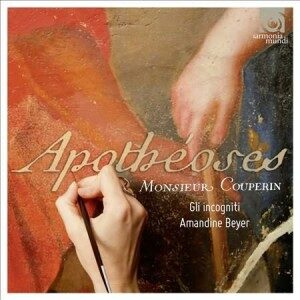Sometime in the 1980s an ensemble called Fretwork released a recording that captured the sound and style of viol consort music as had never been done with such technical brilliance and affecting musicality. And the recorded sound was extraordinarily rich and warmly resonant, the melodies ingratiating, the harmonies soul-satisfying–you could just play the disc over and over and always get the same feeling of congenial calm. This is not a program of viol music, but it has the same spirit as that earlier Fretwork disc–and virtually the same effect (and affect).
Forget trying to understand the music on hand by reading the disc’s liner notes, which have less to do with the music and more to indulge regarding rhetoric and mythology. I have to admit that my intellectual resources are stretched when I read such passages as: “…it is precisely this tension, this confrontation of disparate elements, this delicate rhetorical and political balance, that makes the music of the French composers of the time so fascinating a world: it goes through two mediators, it sets up two triangles, often interpreted as antagonistic–Grace and Passion. It is worth noting here the Rumeur souterraine of the Apothéose de Lully, an avowed paraphrase of the concerti grossi of Corelli, associated with ardent sentiment: this intrudes between a divine Descente, noble and march-like, and a Plainte, an expression of intimate feeling, the instruments instructed to play very gently, in loure time. Each identity possesses its rhetorical weight and thus erects a theatrical framework.” Thankfully, we can just listen to the music and escape any confrontations with mediators and triangles.
And the music is wonderful. Couperin’s tributes to Corelli and Lully, laden with personalized stylistic and classical mythological references–Parnassus, Apollo, Muses, Hippocrene–smooth across the ear like the proverbial butter on warm pancakes. The combination of violins, keyboard, theorbo, and gamba easily give the impression that no more ideal group of instruments ever could have been conceived, this is such luxurious yet so intimate and so amazingly easy to listen to. And there are at least a few surprises, including the occasional, wonderful violin duets, and the gorgeous, mystifyingly beautiful first movement of La Sultane, which sounds like it comes from another time and place, a yet-unexplored world far removed from the conventional musical terroir of late-17th-century France.
Violinist Amandine Beyer & Co. are superb musicians whose first-rate performances and dedication to this project give us cause to take both a newly respectful look at these works and to cast a freshly interested eye on this composer’s non-keyboard, chamber compositions. My only complaint is that the subtitles, movement titles, and descriptions thereof are given only in French. Why? Yes, I can decipher them, armed with several years of French language study and my trusty French dictionary–but this shouldn’t be necessary in today’s world. What’s the problem with just giving us the translations? Anyway, don’t let this stop you from an ethereal listening experience. Highly recommended.
































